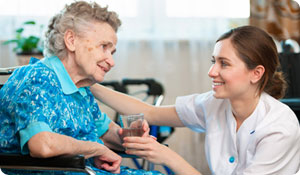
Diagnosing Alzheimer's is tricky because so many of the symptoms resemble those of other forms of dementia and even what is considered normal aging. But according to the Alzheimer's Foundation of America, it is now possible for doctors to identify the disease with up to 90 percent accuracy.
Early screening for Alzheimer's Disease tests for common symptoms and helps patients and their families maintain a a normal quality of life as long as possible and plan ahead for what are likely to be inevitable changes. In an initial screening, doctors use questionnaires and direct interviews to look for specific symptoms, known as the "four "A's of Alzheimer's": Amnesia, Aphasia, apraxia, and Agnosia.
- Amnesia can affect short-term or long-term memory. In someone with Alzheimer's disease, short-term memory goes first.
- Aphasia is a loss of communication skills. This can result in an inability to remember, speak or understand words that are commonly used for expression.
- Apraxia is a loss of motor skills. These can range from simple, everyday activities such as brushing teeth to using a computer or fax machine.
- Agnosia is an inability to respond to sensory signals. This is when someone with Alzheimer's disease cannot recognize a friend or family member or recognize physical signals such as needing to use the bathroom.
Screening for these symptoms often involves the cooperation of family members or other caregivers, who may witness the effect these changes have on a patient's ability to perform normal, daily tasks. Doctors find that responses to standard questions from the patients themselves are sometimes unreliable because someone with Alzheimer's disease may not be fully aware of the changes or might try to cover up the existing symptoms.
Neurological screening tests include questions regarding any changes that have occurred in thinking, memory, behavior, or language skills. These may include poor decision making, forgetfulness, loss of concentration, inability to learn how to use a simple appliance or tool, loss of interest in long-time hobbies or activities, and repetition, such as telling the same story or asking the same question over and over again.
Tests administered to patients require such tasks as remembering the date, listing words that begin with a particular letter, and identifying common objects seen in photographs or drawings. The patient's responses are rated on a scale and used to assess the degree of brain damage and the stage of the disease.
No screening test gives a doctor the information necessary to make an accurate diagnosis of Alzheimer's disease. Rather, the test results become part of a screening package doctor's use, along with family history, medical, behavioral, and psychological evaluations, and direct observation to come up with a diagnosis and treatment plan.
Sources:
Alzheimer's Foundation of America
http://www.alzfdn.org/AboutAlzheimers/diagnosis.html
UC Davis Alzheimer's Disease Research Center: Neuropsychological Testing
http://alzheimer.ucdavis.edu/faq/tests/index.php
Washington University in St. Louis: Friends, Family Detect Early Alzheimer's Signals Better Than Traditional Tests.
Washington Univrsity: AD8 Dementia Screening Interview
http://alzheimer.wustl.edu/about_us/pdfs/ad8form2005.pdf





